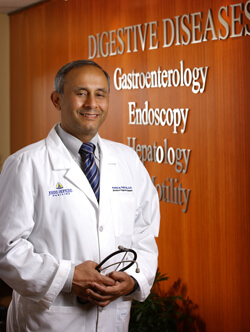
Inside Tract
September 1, 2013

Finally, Emma made the trip from her home country of
England to the Johns Hopkins Center for Neurogastroenter-ology, where she met with Jay Pasricha and his team.
"A lot of patients come to us enmeshed in 'furor medicus,' where they've had every possible test done again and again," Pasricha says.
After several weeks of consultations and observations, Pasricha found Emma's problem: a gastric volvulus. "Her stomach was getting twisted and it was making her terribly sick," he says. "It would work itself out and she'd get better. And then it would happen again. It was elusive to imaging, making it very difficult to diagnose."
Before Emma returned home, Johns Hopkins surgeon Michael Marohn performed a gastroplexy to prevent her problem from coming back.
Medical mysteries are commonplace for Pasricha. "The enteric nervous system-the brain and the gut-is a kind of mystery to begin with," he says. "Nobody really understands how it works in health, let alone what happens in disease states."
When patients visit Pasricha, they often describe symptoms that don't make sense or that defy simple diagnostic or therapeutic procedure.
Even when psychosocial factors play a role in their conditions, Pasricha says the Johns Hopkins Neurogastroenterology team is committed to helping patients get better. "We try to bring a multidisciplinary approach," he says. "We work closely with our colleagues in Psychiatry and other relevant divisions across the institution."
Diagnosing and treating patients with mysterious symptoms often isn't a quick process. "The first thing we tell them is that they need to be prepared for the long haul," Pasricha says. "The second point we make is no matter whether or not we find a smoking gun, we'll help you learn to cope with your problem and restore your quality of life."

